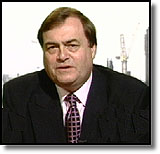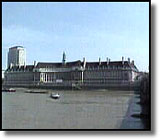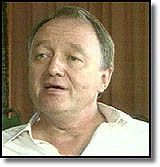
|
Plans Outlined for London Mayor and AssemblyThe Government has outlined its plans for a new strategic authority for London and the country's first directly elected mayor.The mayor would be a "mover and shaker forging partnerships and getting things done", said the Deputy Prime Minister, John Prescott. He compared him to a dynamic chief executive, and said every modern-day Dick Whittington would have a chance to stand for election. "We believe Londoners want someone to speak up for their capital," said Mr Prescott. "Someone who will be able to tackle its problems, promote its interests and plan on a city-wide scale." "In short, they want leadership for the whole of London, both for its deprived and successful citizens," he continued. "That is why this Government is pledged to give Londoners the right to elect both the Mayor and the Assembly who will together form a new Greater London Authority."
The Conservatives are predicting the new assembly will be a re-run of the controversial Greater London Council, GLC, headed by Labour MP Ken Livingstone and abolished by Margaret Thatcher in 1985.
"London needs a voice, not new layers of politicians and bureaucrats," said the Shadow Secretary of State for the Environment, Transport and the Regions, Sir Norman Fowler MP. "The best solution is a Mayor but not a Greater London Authority," he said. "Any new system should build upon the existing structure of local government in the capital. It should not undermine the work of elected borough councillors as the Greater London Authority would do." But Mr Prescott promised the new body would not be a GLC Mark II. "We are not seeking to create a new GLC. This will be a new model of local Government, small, strategic and focused and backed up by five million London voters to give the capital the leadership it deserves," he insisted. "The Mayor of London will not be a ceremonial figure but someone more akin to a dynamic chief executive. A mover and shaker who would forge partnerships with others and get things done. At the same time the Mayor must work within a proper framework of accountability," said Mr Prescott. The Government will hold a three-month consultation before setting out its final proposals in a White Paper next Spring. Londoners will then have the opportunity, subject to the passing of a Referendum Bill, to say whether or not they want the new authority. The Green Paper "New Leadership for London" proposes a slim-line assembly made up of between 24 and 32 members. The assembly would:
There would also be a new police authority with democratic representation.
Candidates for Mayor
Possible contenders for the position of Mayor of London include the former Tory politicians, Steven Norris and Lord Archer. Lord Archer has said he disagreed with Margaret Thatcher over the abolition of the GLC. "I was a member of the Greater London Council and it was one of the few things we genuinely disagreed on," said Lord Archer. "I was among the first to agree with having a Mayor of London when the idea came up and I was delighted when my Party changed its mind."
The former leader of the GLC, Labour MP Ken Livingstone, said he would be interested in running for Mayor "if there was real power". Argiong that part of the problem with the GLC was that it had very limited powers, Mr Livingstone said: "We couldn't co-ordinate the transport system in the way we wanted. My great worry is that this new body won't have the ability to have a council tax of some kind in order to fund services like re-building the tube."
|
Diana, Princess of Wales, 1961-1997
Conference 97
Devolution
The Archive
News |
Issues |
Background |
Parties |
Analysis |
TV/Radio/Web
Interactive |
Forum |
Live |
About This Site
News |
Issues |
Background |
Parties |
Analysis |
TV/Radio/Web
Interactive |
Forum |
Live |
About This Site
© BBC 1997 |
politics97@bbc.co.uk |



